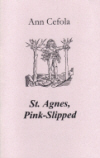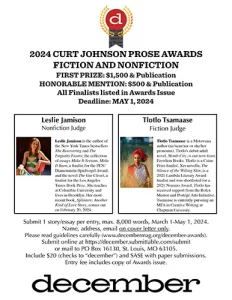St. Agnes, Pink-Slipped
Within this brief but multitudinous chapbook, Ann Cefola contemplates ordinary existence alongside the sacred. In 28 poems of varying form—some splaying across the page, others in neat, organized stanzas—St. Agnes, Pink-Slipped investigates the constant buzz and movement of modern existence through these lyrical narratives. The world of schoolboys, make-up counters, hotels that may appear familiar is elevated into something of greater importance.
Within this brief but multitudinous chapbook, Ann Cefola contemplates ordinary existence alongside the sacred. In 28 poems of varying form—some splaying across the page, others in neat, organized stanzas—St. Agnes, Pink-Slipped investigates the constant buzz and movement of modern existence through these lyrical narratives. The world of schoolboys, make-up counters, hotels that may appear familiar is elevated into something of greater importance.
While many characters inhabit this chapbook, many poems dwell on the lives of women. Early on in the chapbook, in “Girls’ Night Out,” a speaker is participating in a gathering of mothers taking a brief respite from their children. The speaker narrates, “Heavy-breasted, dark eyed, they praise / the rented lines and Kelly’s cut hydrangeas. / Lighting up, they smoke like soldiers,” while the speaker, without children, thinks, “I consider my uterus / untraveled as a new triple-digit Interstate.” This discomfort with everyday existence continues in “First Job” where a secretary in a low-pay job tries on shoes at Saks, thinking “Once again, I turn and walk, turn and walk, / knowing my tender foot can never wear this point, / this unsteady heel.”
An awareness of consumerism comforts continues to permeate the chapbook in “Price Club.” During a day out shopping, the speaker considers herself: “I am Solomon between expense and uselessness.” She thinks about her material purchases, then, projecting:
If I choose wisely,
a bell with ring, the cashier will wish me a nice day,
and I will preside over a new estate, closing
cupboards safely over bright-labeled cans,
arranging lipstick and comb in my new purse
that yields them back as I need them,
my small fiefdom, the serfs I can count on,
their tactile faces loyal and willing.
The combination of womanhood and its objectivity through buying continues as a motif, encapsulated in “Teint Pur Mat,” where the speaker recalls “how make-up marks my life” while watching her mother apply makeup and perfume. The speaker delights “when she buys my first / blush, plastic tube squirting peach, a lifelong quest // for color commences, etched joy, sparkle-laden brush.” This attention to the superficial, detailed in bright, colorful language, slowly shifts toward the pressing matter of temporality.
The chapbook’s title poem, crafted in meandering quatrains, depicts the speaker’s observations when the local hospital changes its name from the religious St. Agnes to Westchester Medical Center. The figure of St. Agnes comes to life as she leaves the hospital: “Melted halo / liquid light around her neck, once golden raiment a yellow / raincoat, hovering toes now firmly bound in sneakers.” As she continues her journey, “she asks for work. . . . Anything not to lose the perfume of seasons.” This pattern of longing continues through the rest of the chapbook, such as in “February,” a poem in tight quatrains, where the speaker laments:
I watch relative after relative disappear,
even my cat, sneeze, stretch, go limp.
My grandmother, small voice in a curled body,
Begs by phone: Pray I get out of here.
The poem then envisions these deaths, describing in haunting lyrical language “eyes dilated and astonished by pure light, / its full spectrum, warmth and speed.”
Tied together through close attention to language and detail, St. Agnes, Pink-Slipped mystifies yet clarifies through its emotional arc, appealing to the sensory details of everyday life and the spiritual beyond.





